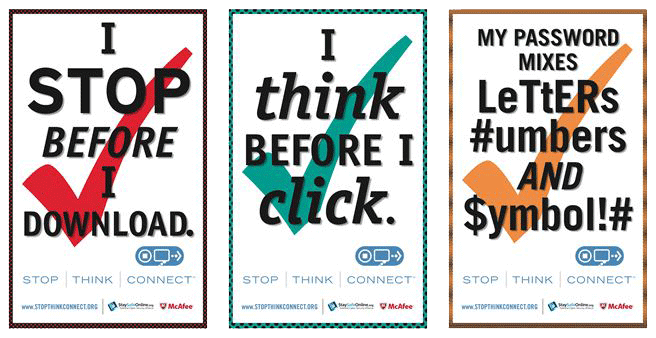The best form of Online Safety begins at home with you, the parent. We offer you the following tips to keep your child safe on the Internet. The best way to know what your child is doing online is to ask. Whether you ask other parents, an Internet-savvy friend, or your child about how they use the Internet, asking the right questions will help you understand what your child is doing online so you can make sure they are making safe online choices.

- Clear, simple, easy-to-read house rules should be posted on or near the monitor. Create your own computer rules. The pledge can be signed by adults and children and should be periodically reviewed.
- Look into safeguarding programs or options your online service provider might offer. These may include monitoring or filtering capabilities.
- Always read a website’s privacy policy before giving any personal information. Also, make sure that a website offers a secure connection before giving credit card information.
- Websites for children are not permitted to request personal information without a parent’s permission. Talk to children about what personal information is and why you should never give it to people online.
- If children use chat or e-mail, talk to them about never meeting in person with anyone they first “met” online.
- Talk to children about not responding to offensive or dangerous e-mail, chat, or other communications. Report any such communication to local law enforcement. Do not delete the offensive or dangerous e-mail; turn off the monitor, and contact local law enforcement.
- Keep the computer in the family room or another open area of your home.
- Get informed about computers and the Internet.
- Let children show you what they can do online, and visit their favorite sites.
- Have children use child-friendly search engines when completing homework.
- Know who children are exchanging e-mails with, and only let them use chat areas when you can supervise. The Vanderburgh County Sheriff’s Office recommends limiting chatroom access to child-friendly chat sites.
- Be aware of any other computers your child may be using.
- Internet accounts should be in the parent’s name with parents having the primary screen name, controlling passwords, and using blocking and/or filtering devices.
- Children should not complete a profile for a service provider and children’s screen names should be nondescript so as not to identify that the user is a child.
- Talk to children about what to do if they see something that makes them feel scared, uncomfortable, or confused. Show them how to turn off the monitor and emphasize that it’s not their fault if they see something upsetting. Remind children to tell a trusted adult if they see something that bothers them online.
- Consider using filtering or monitoring software for your computer. Filtering products that use whitelisting, which only allows a child access to a preapproved list of sites, are recommended.
- If you suspect online “stalking” or sexual exploitation of a child, report it to your local law enforcement agency. The National Center for Missing & Exploited Children (NCMEC) has a system for identifying online predators and child pornographers and contributing to law-enforcement investigations. It’s called the CyberTipline®. Leads forwarded to the site will be acknowledged and shared with the appropriate law enforcement agency for investigation.
Cyber Bullies
Just as a child may encounter bullying or aggressive behavior from other students in school, they may be subject to bullying online. So-called “cyber bullies” may send harmful and cruel words or images through the Internet or an electronic device such as a cell phone, in order to harass, embarrass, humiliate, and threaten their target. Other forms of bullying include password hacking, identity theft and blackmail. While some are anonymous, cyber bullies are often kids who are known by a child from their school, camp, community group, or neighborhood. It is important to talk openly with children about how to handle cyber bullying issues. If your child encounters a form of cyber bullying, remember that bullies thrive on the reactions of their targets. Children should avoid escalating the situation by refraining from responding to the bully. Parents should contact your local authorities if the problem persists. Be sure to save all messages, including dates and time.


